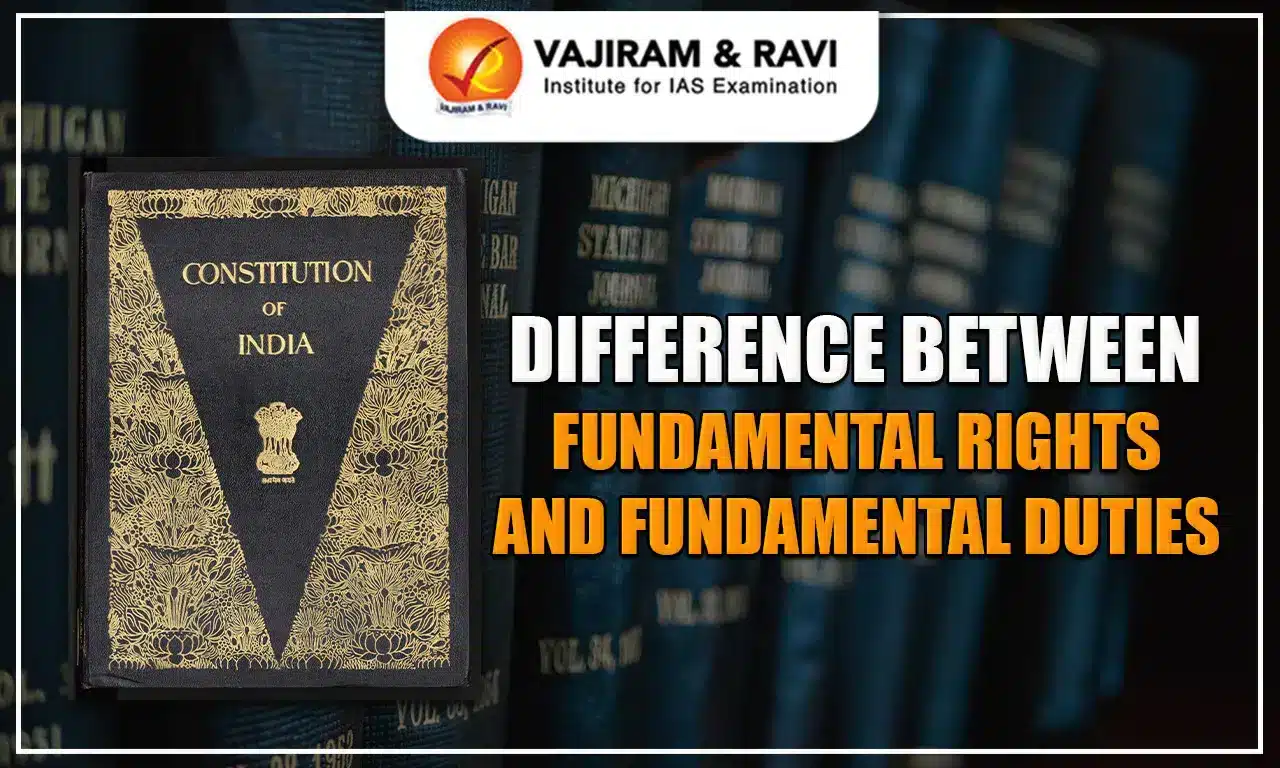The Difference between Fundamental Rights and Fundamental Duties have been discussed below in the article.
Fundamental Rights are basic human rights granted to the citizens of India. Originally, the Constitution provided seven Fundamental Rights, but the Right to Property was removed from Part III through the 44th Amendment Act, 1978.
Fundamental Duties, on the other hand, were incorporated into the Constitution by the 42nd Amendment Act, 1976, based on the recommendations of the Swaran Singh Committee constituted by the government.
Difference Between Fundamental Rights and Fundamental Duties
Following are the major differences between fundamental Rights and Fundamental Duties:
|
Aspect |
Fundamental Rights |
Fundamental Duties |
|
Definition |
Basic human rights guaranteed by the Constitution to individuals. |
Obligations that citizens are expected to fulfill towards the nation. |
|
Nature |
Rights are justiciable and enforceable by courts. |
Duties are non-justiciable and cannot be enforced in a court of law. |
|
Part of Constitution |
Mentioned in Part III of the Constitution. |
Mentioned in Part IV-A of the Constitution. |
|
Inclusion |
Present in the original Constitution (1949). |
Added through the 42nd Amendment Act, 1976. |
|
Purpose |
Protect individual freedoms and ensure equality. |
Promote a sense of responsibility and respect for the nation and its Constitution. |
|
Number |
Initially 7 (now 6 after the Right to Property was removed by the 44th Amendment, 1978). |
Currently, there are 11 Fundamental Duties. |
|
Beneficiaries |
Applicable to individuals; protects citizens against State actions. |
Obligatory for every citizen of India. |
|
Example |
Right to Equality, Right to Freedom, Right to Constitutional Remedies. |
Respecting the Constitution, protecting the environment, upholding the sovereignty of the nation. |
Fundamental Rights
Fundamental Rights are the essential human rights guaranteed to citizens for their existence and development. They are termed fundamental for three primary reasons:
- They are explicitly written in the Constitution.
- They uphold democratic principles.
- They are justiciable, meaning individuals can seek enforcement through courts.
These rights are enshrined in Part III of the Indian Constitution, spanning Articles 14 to 35. If these rights are violated, individuals can approach the courts for protection.
The Indian Constitution guarantees six Fundamental Rights to its citizens:
- Right to Equality
- Right to Freedom
- Right against Exploitation
- Right to Freedom of Religion
- Cultural and Educational Rights
- Right to Constitutional Remedies
Fundamental Duties
Just as citizens enjoy Fundamental Rights, they also have Fundamental Duties. These duties call for active participation in the governance of the country by embracing responsibilities and fulfilling citizenship obligations. Fundamental Duties are outlined in Article 51A of the Indian Constitution and are embedded within various laws.
The Fundamental Duties of Indian citizens include:
- Upholding and abiding by the values of the Indian Constitution.
- Showing respect to the National Flag and National Anthem.
- Preserving the sovereignty, unity, and integrity of the country.
- Promoting national harmony and fostering a spirit of brotherhood.
- Protecting and enhancing the natural environment, including forests, rivers, lakes, and wildlife.
- Respecting and upholding the dignity of women.
- Demonstrating compassion for living beings.
- Safeguarding public property and renouncing violence.
- Providing educational opportunities to children aged 6–14 years, as a parental or guardian duty.
- Cultivating scientific temper, humanism, and a spirit of inquiry and reform.
Key Difference from Fundamental Rights: Unlike Fundamental Rights, Fundamental Duties are non-justiciable, meaning citizens cannot approach courts to enforce these duties in case of non-compliance.
Last updated on November, 2025
→ Check out the latest UPSC Syllabus 2026 here.
→ Join Vajiram & Ravi’s Interview Guidance Programme for expert help to crack your final UPSC stage.
→ UPSC Mains Result 2025 is now out.
→ UPSC Notification 2026 is scheduled to be released on January 14, 2026.
→ UPSC Calendar 2026 is released on 15th May, 2025.
→ The UPSC Vacancy 2025 were released 1129, out of which 979 were for UPSC CSE and remaining 150 are for UPSC IFoS.
→ UPSC Prelims 2026 will be conducted on 24th May, 2026 & UPSC Mains 2026 will be conducted on 21st August 2026.
→ The UPSC Selection Process is of 3 stages-Prelims, Mains and Interview.
→ UPSC Result 2024 is released with latest UPSC Marksheet 2024. Check Now!
→ UPSC Prelims Result 2025 is out now for the CSE held on 25 May 2025.
→ UPSC Toppers List 2024 is released now. Shakti Dubey is UPSC AIR 1 2024 Topper.
→ UPSC Prelims Question Paper 2025 and Unofficial Prelims Answer Key 2025 are available now.
→ UPSC Mains Question Paper 2025 is out for Essay, GS 1, 2, 3 & GS 4.
→ UPSC Mains Indian Language Question Paper 2025 is now out.
→ UPSC Mains Optional Question Paper 2025 is now out.
→ Also check Best IAS Coaching in Delhi
Difference Between Fundamental Rights and Fundamental Duties FAQs
Q1. What is the difference between rights and duties?+
Q2. What is the difference between fundamental rights and fundamental freedoms?+
Q3. What are the fundamental rights and fundamental duties of UPSC?+
Q4. How many Fundamental Rights are guaranteed to Indian citizens, and what are some examples of these rights?+
Q5. What is the legal status of Fundamental Duties, and can citizens be penalized for not fulfilling them?+
Tags: Difference Between Fundamental Rights and Fundamental Duties

















